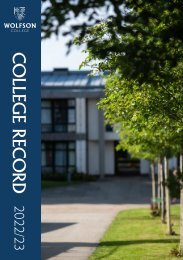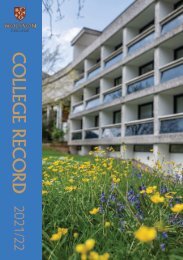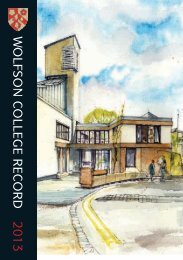You also want an ePaper? Increase the reach of your titles
YUMPU automatically turns print PDFs into web optimized ePapers that Google loves.
chaired the University’s committee on admissions in 1962. Brock brought to<br />
Oxford’s admissions debate two of the administrator’s skills: a meticulous pursuit<br />
of relevant empirical detail, and a faith that its accumulation would generate the<br />
consensus that was so central to Brock family traditions. He detected in himself<br />
a ‘habitual tendency to discover that everybody is quite right’: this ‘was, and is,<br />
my temper’. He was later a founder member of the Social Democratic Party, and<br />
was unobtrusively central to Roy Jenkins’s successful campaign in 1987 to succeed<br />
Harold Macmillan as the University’s Chancellor. These empirical and consensual<br />
features – accuracy, balance, perspective, lucidity, open-mindedness – were also<br />
integral to the fine historian that he was.<br />
Thus equipped, Brock set out to buttress useful institutions and to challenge those<br />
that he thought redundant. Cambridge preceded Oxford in reducing language<br />
requirements at admission, and Brock was alert to Cambridge’s competition, but<br />
his concerns were wider: he thought his researches would tempt Oxford into<br />
more meritocratic recruitment. Powering his reforming and researching impulse<br />
was an intense institutional loyalty, especially to his family. Much-loved uncles<br />
and aunts in this extended family had regularly visited his parents on Sundays:<br />
‘I was frightfully lucky in my aunts and uncles altogether’, he told me, especially<br />
in his headmistress aunt Dame Dorothy Brock and in his publisher uncle Percy<br />
Hodder-Williams. Brock was also loyal to his school, his World War II regiment<br />
(the Middlesex), his successive Oxford colleges, and his university. Convinced that<br />
one must reform in order to preserve, he was in short a nineteenth-century British<br />
Whig, and when Oxford momentarily lost its balance in 1985 he was unashamed<br />
in voting for Thatcher’s honorary degree: ‘I did so rather publicly’, he recalled in<br />
1988, ‘sitting behind the Vice-Chancellor. I’d do it again’. He was a Whig, too, in his<br />
zeal for an extended participation which would stabilize authority by broadening<br />
its base – not a stance then inevitable among seasoned University administrators.<br />
At both his graduate colleges, Wolfson and Nuffield, he successfully pursued a<br />
genuine internal democracy.<br />
Brock was a gifted tutor, uniting his mother’s intuitive qualities with his civil-servant<br />
father’s calm rationality and balance. In a small college like Corpus before ‘history’<br />
and ‘politics’ were mistakenly prised apart after the 1960s, a single tutor taught<br />
29
















